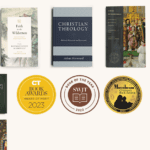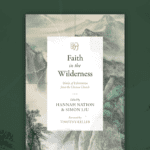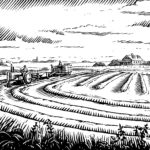
In this excerpt from Faith in the Wilderness: Exhortations from the Chinese Church, Guo Muyun reflects on the nature of disasters and finding God’s great mercy in midst of them.
There is a popular song adapted from a poem by Yu Xinqiao. The refrain, which is also the name of the song, repeats: “In this life, if I must die, I must die in your hands.” In 2 Samuel 24, God offers three disasters for David to consider and choose from: war, famine, or pestilence. David responds by saying something similar, “Let us fall into the hand of the Lord … but let me not fall into the hand of man,” meaning, “If I must die, I must die in the hands of the Lord.”
David’s choice demonstrates his unconditional trust in God. Three years of famine, three months of war, or three days of pestilence: which would you choose? No matter what David chose he would certainly bring death to his nation. He replied: “I am in great distress. Let us fall into the hand of the LORD, for his mercy is great; but let me not fall into the hand of man” (2 Samuel 24:14). Those who truly know God will all make such a choice. David, and subsequently Christians, was clear that it is more dreadful to fall into the hands of men, represented by famine and the sword. He knew very clearly that, while God sends disasters, he can also stop them. He can afflict you, but he can also heal you, and he is the most merciful. To fall into the hand of God resigns ourselves to providence, which is the best choice in a difficult situation.
God made the choice for him. The God whose mercy is great chose to send pestilence. The deaths of 70,000 Israelites in three days may look startling, yet compared to the potentially greater disasters of famine and sword, this is possibly the lightest punishment. Of course, the deaths of 70,000 is a grave thing; in the words of Takeshi Kitano, a Japanese director, we are discussing the death of one person that takes place 70,000 times.
With such a horrible situation, David’s confession became even more urgent. While his words seem uncertain, he bore responsibility. He prayed to God, “I have sinned, and I have done wickedly. But these sheep, what have they done? Please let your hand be against me and against my father’s house” (2 Samuel 24:17). Even before his prayer, the merciful God had asked the angel who was working destruction among the people to stay his hand.
What was the purpose of the pestilence? This pestilence, which David caused, might have been one of the lightest disasters sent by God because of his great mercy. I am not sure whether the pestilence we and the whole world experienced was one of the lightest disasters sent by God. I hope this God of mercy is merciful toward us, because it is better for us to fall into the hand of God than into the hand of man. However, we cannot neglect or forget the meaning and purpose of disasters. All disasters are opportunities to confess our sins according to our particular situations and give thanks and glory to God—who demands justice and righteousness, has no tolerance for sin, but is full of mercy.
Our own pestilence
Even though the pestilence has broken and spread out, we still give thanks to God, because he is full of mercy. It is grace to fall into his hand, because he has sent the lightest possible disaster, this pestilence, to warn us and give us time to repent for this nation’s and this people’s great sins. As the saying goes, “It is up to the doer to untie the knot.” We pray to him, that the God who sent the plague will also be the God who stops the plague. He is the only one who can make the pestilence pass from us, as we cannot overcome the pestilence. We pray for him to stay the hand of destruction.
God listens to those with broken and contrite hearts, those who pray like David. God himself said in the Bible, “If there is famine in the land, if there is pestilence or blight or mildew or locust or caterpillar, if their enemies besiege them in the land at their gates, whatever plague, whatever sickness there is, whatever prayer, whatever plea is made by any man or by all your people Israel, each knowing his own affliction and his own sorrow and stretching out his hands toward this house, then hear from heaven your dwelling place and forgive and render to each whose heart you know, according to all his ways” (2 Chronicles 6:28–30). His promises are such that in disaster, pestilence, or famine, if we pray to him, sincerely confessing and repenting of our sins, God will forgive and help us.
The Christian’s hope lies in this: we are not stronger or purer than others. Instead, rather than believing in ourselves, we believe in Jesus, who upholds us when we fall, who comforts us when we give up, who strengthens us when our strength is drained, who loves us when we are in pain, who does not give us up even when we are hopeless about ourselves.
As a result of this pestilence, my hope is for people to hear the gospel of God. If disaster makes you desperate, if human nature horrifies you and leads you to understand the meaning of “let me not fall into the hand of man,” I hope your despair will not lead you into a chasm of hopelessness. I hope that in such despair you will begin to lose hope in humanity and begin to have hope in God, in this Jesus who can save us. Rise up and pray to him. I hope those outside the church and those who do not yet know Christ will come to the church he established on earth. I hope those of you who are in false churches will be free from their bondage. I pray God’s true church will live out a true witness. May the grace of God come down to us, to all people and all nations, so that kings will bow their heads and confess their sins in humility of heart and posture; so that prophets speak up with boldness spreading the gospel everywhere; so that priests will stand out and guard the people; so that the people will all confess their sins and look up to this true savior, Jesus Christ.
This post was adapted from Faith in the Wilderness: Words of Exhortation from the Chinese Church edited by Hannah Nation and Simon Liu (Kirkdale Press, 2022).







